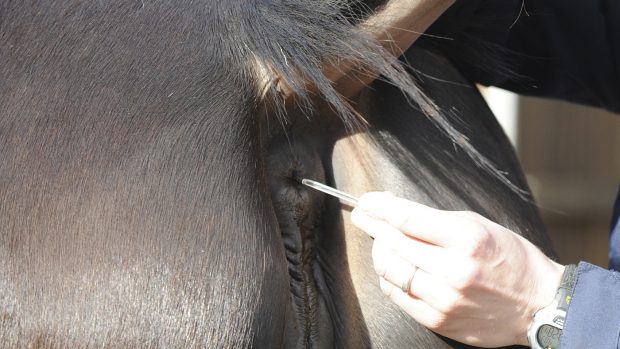In the absence of your usual products, we look into the kitchen to discover some interesting alternatives.
- Honey
Useful in tempting fussy feeders and sick or tired horses as a high sugar and high energy feed.
There is evidence that honey can be used as an antibacterial agent, but it is better known relation to respiratory problems.Honey may also be used on burns, as it provides an easily removed sticky, airtight covering. - Cider vinegar
Most commonly used in the management of arthritic horses as a means of preventing calcification of the joints.
Cider vinegar is rich in all the components of apples, particularly acids, which is probably the main active principle.Cider vinegar can be used as a wash to improve the bloom of the horse’s coat and will help to repel flies. - Black treacle
Black treacle and molasses are famed for their palatability and energy, both attributable to high sugar content, and the stickiness which helps to bind feed and reduce dust. - Bran
Bran has uses both as a feedstuff and a heat retaining material for poulticing.
Bran has a fibre content less than forages, but more than traditionalcompounds. It has an energy content similar to medium energy feeds and a protein content of 14%, although the quality of this is poor.
It is also great for tempting a tired or fussy horse to eat. However, like other cereal products, it contains ahigh level of phosphorus and almost no calcium. Therefore, it is not advisable to feed any great weight of bran, and a calcium supplement should always be fed if you are feeding more than 3lbs of bran in the ration. - Epsom salts
The common name for the chemical blend of magnesium and sulphate, known for its laxative properties. Opinion varies on whether Epsom salts are good or bad, as it is easy to overdo them and there are better alternatives. Modern nutritional thinking does not agree with purging your horse regularly. - Mustard
Seeds are the most commonly used part of the plant, particularly those of black mustard. Mustard seeds are high in a sulphur containing volatile oil. At varying levels,this can act as a stimulant, irritant, diuretic and emetic.
Infusions of the seeds were used historically to relieve chronic bronchitis, and, for owners, hot water poured on mustard seeds apparently makes a stimulating foot bath and helps dispel acold or a headache. - Cream of tartar
Used by one leading stallion owner to “thin the semen” and control an otherwise excitable male. - Garlic
Garlic has antiseptic, antibiotic, anthelmintic and expectorant properties. It is best known as a respiratory herb, removing any mucus and acting against any infection.
Also used as a probiotic – creating the right environment in the gut for beneficial bacteria to grow.
Garlic is rich in sulphur,and can deter biting flies as it is excreted through the pores of the skin.
When made into a paste with castor oil it can be rubbed into sarcoids, and the juice from a bulb of can be used on cuts. - Apples
The natural plant sugar is used to add variety to the horse¨s diet and tempt fussy feeders. One or two apples won’t harm the nutritional balance of the diet ¨ 8kg of apples is equivalent to 1kg of barley or 1.3kg of oats. - Bananas
Predominately as an energy source — 85% of a dried banana is sugar. - Comfrey
Comfrey leaf is best known for healing bone, cartilage and soft tissue, hence its common name “knitbone”. This is thought to be due to the chemical allantoin, which is known to stimulate cell production.
Can be used to calm inflammation of the gut lining and as an expectorant. Tactical appropriate use (a handful of fresh leaves per day) is unlikely to cause a problem in horses.



